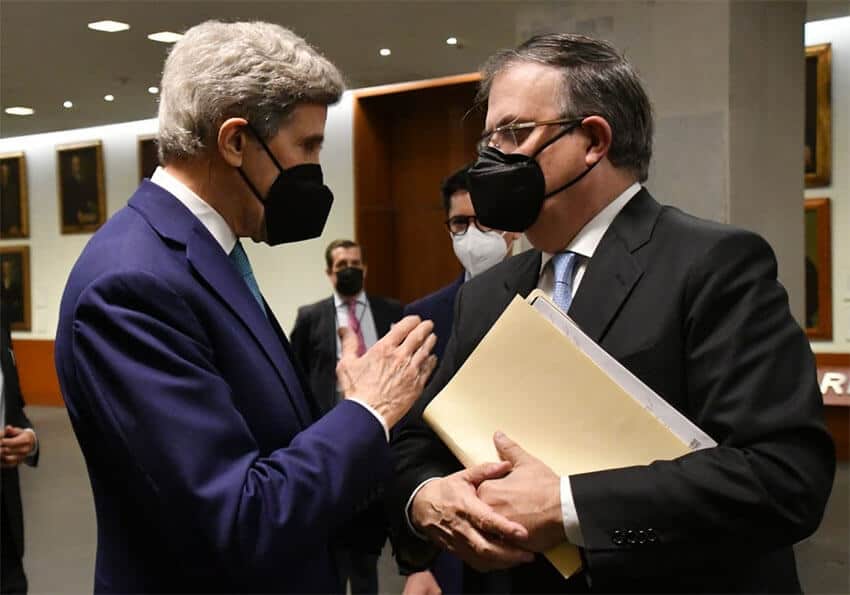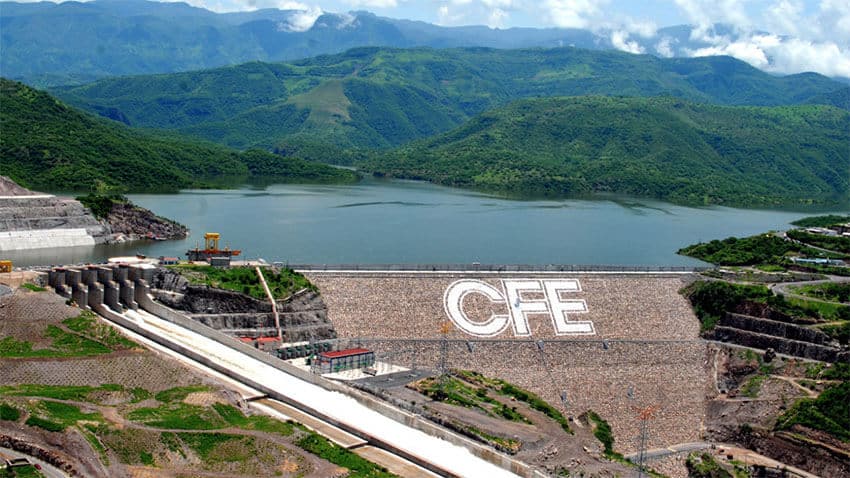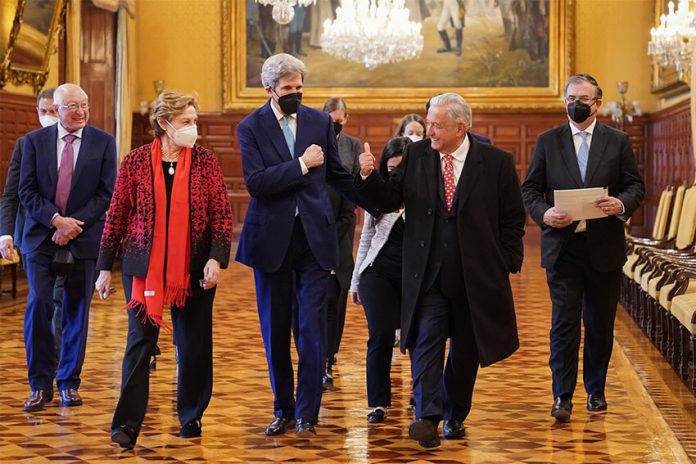Mexico and the United States have agreed to form a working group to collaborate on the fight against climate change.
After a lengthy meeting between President López Obrador and United States Special Presidential Envoy for Climate John Kerry in Mexico City on Wednesday, Foreign Minister Marcelo Ebrard announced an agreement to create the U.S.-Mexico Climate and Clean Energy Working Group.
Via the group, which will involve key agencies in both Mexico and the United States, the two countries will determine what actions they can take together to mitigate climate change, Ebrard told reporters.
López Obrador’s office and the United States Embassy in Mexico later issued similar statements on the objectives of the working group.
“During the bilateral meetings … the delegations of both countries reiterated the commitment to act swiftly and ambitiously on five lines of action for the purpose of combating the effects of climate change,” the president’s office said.

The U.S. statement said the policy focus areas of the working group will include: accelerating renewable energy development including solar supply chains; tackling methane emissions from oil and gas, waste, and agriculture; reducing transportation emissions through electrification and other strategies; eliminating deforestation and supporting nature-based solutions; and Nationally Determined Contributions (NDCs).
NDCs are efforts by individual countries to reduce national emissions and adapt to the impacts of climate change.
“The two sides … agreed to meet in the next 30 days to consider opportunities for rapidly enhancing clean energy deployment,” the U.S. statement said.
Mexico’s statement said that López Obrador had stressed to Kerry that the priority of his government is to put an end to corruption. In that context, the president “highlighted the urgent need to modify the current electricity scheme in Mexico.”
The Mexican Congress is set to vote as soon as next month on a proposed electricity reform that would guarantee 54% of the electricity market to the fossil fuel-dependent, state-owned Federal Electricity Commission (CFE) and thus limit the participation of private renewable firms.
The United States has raised a range of concerns about the planned constitutional change, arguing that it will have a negative impact on U.S. investment in Mexico, hinder U.S.-Mexico joint efforts on clean energy and climate and adversely affect Mexican consumers and the Mexican economy.
The U.S. statement said that Kerry and Ambassador to Mexico Ken Salazar “raised the significant concerns the Biden-Harris Administration has about Mexico’s current energy-sector proposal and the imperative to bolster open and competitive economies, consistent with USMCA,” the North America free trade agreement.
The USMCA prohibits favoring national companies, including state-owned ones, over firms from the other partner countries.
In an interview with news agency Reuters, Kerry said the talks with Mexican officials were “very constructive” and the two sides “found an enormous amount to agree on” vis-à-vis the benefits of using renewable energy.
With regard to Mexico’s energy sector plans, “we expressed concerns that we not run up against the USMCA,” the U.S. climate czar said.
“[We said] that it’s important to have reforms that are going to be — and I think [López Obrador] wants this — that reforms will not act as a hindrance to an open and competitive market,” Kerry said.
“The key … is attracting investment and participation,” he told Reuters.

In earlier public remarks, Kerry said the U.S. government was ready to be “as helpful as we can be” in promoting the use of electric vehicles and renewable energy in Mexico. He said that the U.S. government is willing to offer financial and technological help to expedite the country’s efforts to combat climate change but stressed that “we respect completely the sovereignty of Mexico.”
“Mexico can play a vital, extraordinary role in our efforts to combat the climate crisis,” the envoy said. “… Working together, North America can become the world’s leading clean energy economy.”
López Obrador, who has promoted the continued use of fossil fuels while pinning his environmental credentials to the government’s reforestation efforts, said Tuesday that Mexico would ramp up its clean energy production if the United States supports the endeavor by providing low-interest loans.
Any loans provided by the United States could be used to fund the modernization of CFE’s aging hydroelectricity plants.
The president said Tuesday that he was committed to strengthening the CFE and guaranteeing that power prices don’t increase excessively. The federal government is also upgrading Pemex’s six existing refineries and building a new one on the Gulf coast in Tabasco. In addition, it recently reached an agreement to purchase Shell Oil Company’s share of the jointly-owned Deer Park oil refinery near Houston, Texas.
As part of López Obrador’s quest to reach national self-sufficiency for fuel – and to bolster his environmental credentials – the state oil company intends to slash crude oil exports this year and end them in 2023.
But there is skepticism that Pemex will be capable of refining all of its own crude given its poor operating and safety record, and López Obrador’s commitment to meaningful action on climate change has been called into question.
Mexico took second place in the Climate Action Network’s “Fossil of the Day” award at last year’s United Nations Climate Change Conference in Glasgow, Scotland, “for pumping more, not less, money into the fossil fuel industry, building oil refineries, and delaying policies aimed at carbon emissions reductions.”
